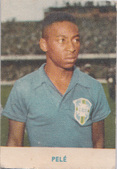
1aPelé (BRA)
1958 Titulares.
Voted World Player of the Century by IFFHS and Athlete of the Century by the International Olympic Committee, Pelé is arguably the greatest football player of all-time. He is the only player to win three World Cups, winning the Golden Ball in the 1958 tournament, and is the all-time leading goal scorer for Brazil with 77 goals in 92 games. He scored 767 goals in official matches (FIFA has reported 1281 goals in all matches). With Santos, Pelé won six league titles between 1961 and 1968.
| 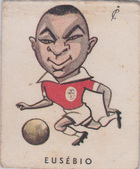
1bEusébio (POR)
1961 Sociedade Nacional de Fosforos Lisboa.
One of the best players of the 1960s, Eusébio won the Ballon d'Or in 1965 and was runner-up in 1962 and 1966. With Benfica, he won an incredible 11 league titles and was the European top scorer for three different seasons. During his professional career, he scored 749 goals in 745 matches at club level and 41 goals for his national team, a total of 790 goals. Eusébio led Portugal to third place at the 1966 World Cup, winning the Golden Boot with 9 goals in the tournament.
| 
1cGeorge Best (IRE)
1964 Barratt.
At his peak, North Irishman George Best was one of the greatest players ever to ever take the pitch. Known as the “fifth Beatle,” his celebrity transcended sport. With Manchester United, Best won league titles in 1965 and 1967. In 1968, he was named European Footballer of the Year after helping United win the Euro Cup. Sadly, alcoholism caused his game to deteriorate.
|
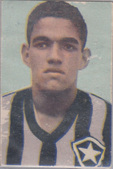
1dGarrincha (BRA)
1956 Idolos.
Brazilian right-winger Garrincha overcame multiple birth defects to become one of the best players in the world, and regarded by many as the best dribbler of all-time. He was one of the best players for Brazil in the 1958 World Cup and, after an injury to Pelé’s in the 1962 World Cup, Garrincha led Brazil to victory in the tournament. With Botafogo, Garrincha won the Campeonato Carioca three times. Brazil never lost a match while fielding both Garrincha and Pelé.
| 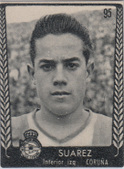
1eLuis Suárez Miramontes (SPA)
1953 Turmo.
The first Spanish-born player to win the Ballon d'Or, attacking midfielder Luis Suárez (not to be confused with the biter) is one of Spain’s all-time greatest players. He won two La Liga titles with Barcelona. He became the world’s most expensive footballer when Barcelona sold him to Inter Milan where he would lead the legendary “Grande Inter” team of the 1960s to three Serie A titles and two Euro Cups. He was Spain’s biggest star when they won the European Championship in 1964.
| 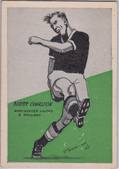
1fBobby Charlton (ENG)
1958 Master Vending.
Sir Bobby Charlton was only 21 years old when he survived the Munich Air Disaster. He would go on to an amazing career as Manchester United as rebuilt, helping the club win three league titles as well as the 1968 Euro Cup. He was instrumental in England winning its first World Cup in 1966 and was awarded the Ballon d'Or in that year. In all, he was capped 106 times and selected to four World Cup teams between 1958 and 1970.
|
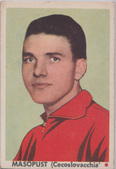
1gJosef Masopust (CZE)
1961 Edizioni Divulgative Illustrate.
Midfielder Josef Masopust led Czechoslovakia to the 1962 World Cup finals where they lost to Brazil despite a goal by Masopust. With ATK Praha (aka Dukla Praha), he won 8 league titles. Masopust was capped 63 times by his country and named the European Footballer of the Year in 1962 due to his accomplishments at the World Cup.
| 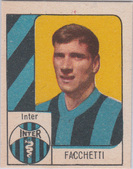
1hGiacinto Facchetti (ITA)
1959 Naninna.
One of the first great attacking fullbacks, Giacinto Facchetti’s physical size made him a key component of “Grande Inter,” which dominated Italian, European and world football during the 1960s primarily due to its defense. With Inter Milan, Facchetti won four league titles, two Euro Cups and two Intercontinental Cups. Facchetti placed second in the 1965 Ballon d'Or voting, narrowing missing becoming the first defender to win the award. He was capped 94 times by Italy, a record at the time, and helped his country to win the 1968 European Football Championship.
| 
1iBobby Moore (ENG)
1962 Quaker Oats.
Widely regarded as one of the greatest defenders of all time, Bobby Moore was captain of the English national team that won the 1966 World Cup. In the final against West Germany, Moore twice connected with West Ham teammate Geoff Hurst who was able to score. Moore was capped 108 times by England, a national record at the time of his retirement.
|
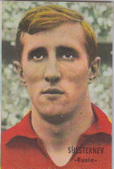
1jAlbert Shesternev (RUS)
1966 Fher.
Nicknamed "Ivan the Terrible,” Albert Shesternev captained the strong Soviet teams of the 1960s. In the 1968 European Football Championship, the Soviet Union tied Italy in the semi-finals (including overtime) and only failed to go to the finals due to losing a coin flip. Shesternev was twice named Soviet Footballer of the Year and finished in the Top 15 in Ballon d'Or voting for three consecutive years despite being a defender.
| 
1kGordon Banks (ENG)
1962 Barratt.
Gordon Banks was named by IFFHS as the second-best goalkeeper of the 20th Century (after Lev Yashin). Already established as England’s top keeper, Banks played every game of England’s 1966 World Cup victory. In the 1970 World Cup, Banks made an incredible save against a powerful Pelé header. That save is known today as “The save of the century.” Banks was named FIFA’s Goalkeeper of the Year on six occasions. During his 73 international games, he kept 35 clean sheets and lost just 9 games.
| 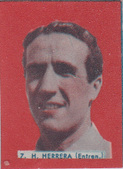
1lManager: Helenio Herrera (ARG)
1953 Editorial Fher.
During his managerial career, Argentine Helenio Herrera won four La Liga titles with Atlético Madrid and Barcelona and three Serie A titles with Inter Milan. It was with Inter that Herrera had his greatest success, winning consecutive Euro Cups in 1964 and 1965.
|
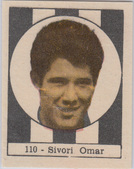
2aOmar Sívori (ARG/ITA)
1957 Edizioni Sport.
Winner of the European Footballer of the Year award in 1961, Argentine Omar Sívori won two Argentine league titles with River Plate and three Serie A titles with Juventus. When Sívori, Antonio Angelillo and Humberto Maschio all moved from Argentina to Italy, they were dubbed “The Angels with Dirty Faces” by the Italian media. Sívori helped the Argentina national team win the 1957South American Championship.
| 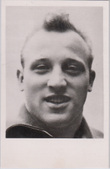
2bUwe Seeler (GER)
1958 Faching.
Uwe Seeler was a prolific scorer who played with West Germany in four World Cups, finishing in fourth place in 1958, second place in 1966 and third place in 1970. He scored 11 goals in total in the four tournaments. Seeler was named German Footballer of the Year in 1960, 1964 and 1970 and was voted German forward of the year for 7 times.
| 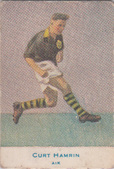
2cKurt Hamrin (SWE)
1953 Alfa.
The 8th highest goalscorer of all-time in Serie A, Kurt Hamrin won two Italian Cups with Fiorentina and one Serie A title and the 1968-69 European Cup with AC Milan. He helped Sweden reach the finals in the 1958 World Cup, including scoring a key goal in the semi-finals against West Germany.
|
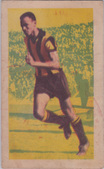
2dAlberto Spencer (ECU)
1966 Ediciones Crack Londres.
One of the greatest players of South American club football, Alberto Spencer holds the record with most goals in the Copa Libertadores, the most important club tournament in South America, with 54. Between 1960 and 1968, he led Peñarol to 7 league titles. Spencer scored 445 goals in his club career.
| 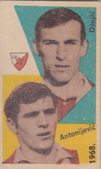
2eDragan Džajić (YUG)
1968 Yugolavian card.
Dragan Džajić is regarded as a preeminent left winger, though somewhat underrated due to playing his entire career in Yugoslavia. His most famous match was the 1968 European Football Championship semi-final match against England, in which his lob over goalkeeper Gordon Banks gave Yugoslavia a 1-0 victory against the defending world champion. He finished third in Ballon d’or voting that year. Džajić won five Yugoslav First League titles with Red Star Belgrade.
| 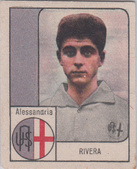
2fGianni Rivera (ITA)
1959 Nanina.
Italy’s “Golden Boy,” Gianni Rivera, won three Serie A titles and two Euro Cups with AC Milan. He won the Ballon d'Or in 1969. For Italy, Rivera was capped 63 times and participated in four World Cups. Rivera was Italy’s star at the 1970 World Cup, although he was not played until 6 minutes were left in the final match and Italy finished in second place to Brazil.
|
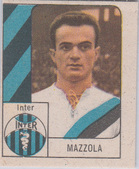
2gSandro Mazzola (ITA)
1960 Naninna.
Son of the legendary Valentino Mazzola, Sandro Mazzola lost his father at age 6, but went on to become a legend in his own right. Playing for “Grande Inter,” four Serie A titles, two Euro Cups and two Intercontinental Cups. He would have been capped more if he did not share a similar role to that of Gianni Rivera, but was nevertheless selected 70 times to the national team which won the 1968 European Football Championship and was runner-up at the 1970 World Cup.
| 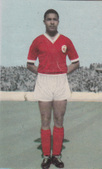
2hMario Coluna (POR)
1955 História e Figuras do Campeonato Nacional de Futebol.
One of the most talented Portuguese players of all time, midfielder Mario Coluna helped Benfica win ten Primeira Liga titles and two European Cups. Capped 57 times, he and Eusébio led Portugal to a third-place finish at the 1966 World Cup.
| 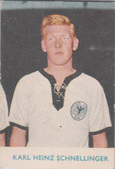
2iKarl-Heinz Schnellinger (GER)
1958 Alfa.
In his prime, Karl-Heinz Schnellinger was considered one of the best leftbacks in the world in his era rivaled only by Giacinto Facchetti, Nilton Santos and Silvio Marzolini. He was one of the first successful German footballers abroad, winning both Serie A and the 1969 Euro Cup with AC Milan. He is one of just a few players to play on in 4 World Cups, as West Germany finished in fourth-place in 1958, runner-up in 1966 and third-place in 1970.
|
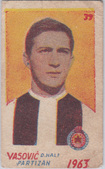
2jVelibor Vasović (YUG)
1963 Yugoslavian.
One of the greatest defenders of his generation, Velibor Vasović won 8 league titles during the 1960s – 5 Yugoslavia First League titles with Partizan Belgrade and Red Star Belgrade and three Eredivisie titles with Ajax. With Partizan, he was runner-up at the 1966 Euro Cup final, one of the greatest successes for a Yugoslavian club. Vasović also captained Ajax to win the 1971 Euro Cup.
| 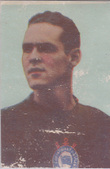
2kGilmar (BRA)
1956 Idolos.
Voted best Brazilian goalkeeper of the 20th Century, Gilmar was capped 94 times by his country and played on the 1958 and 1962 teams that won the World Cup. Playing for the Corinthians, Gilmar won three state championships between 1951 and 1954. In 1961 he joined Santos to form one of the best club teams ever. With Gilmar teaming up with Pelé, Zito, Coutinho and others, Santos won five São Paulo State Championships, five National Championships, two Libertadores Cups and two Intercontinental Cups.
| 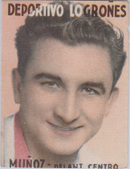
2lManager: Miguel Muñoz (SPA)
1943 Ases Del Futbol.
One of the few people to achieve huge success at the same club as both player and manager, Miguel Muñoz ranks as arguably the most successful coach in the history of Spanish football. After ten years as a player with Real Madrid in which he captained their great team of the 1950s, he spent 14 years as manager which brought a remarkable 9 La Liga titles and made him the first person to win the European Cup as both a player and coach.
|
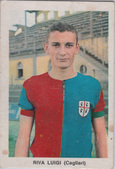
3aLuigi Riva (ITA)
1963 Stef Campionato.
Italy's leading scorer of all time, Luigi Riva was one of the best strikers of his generation. He was the Serie A top scorer for 3 seasons, scoring 170 league goals in 338 appearances in his career. He led Cagliari to its only Serie A title in 1969 (and to runner-up the previous year). Riva scored 35 goals in 42 appearances for Italy and was a member of the national side that won the 1968 European Championship and was runner-up at the 1970 World Cup.
| 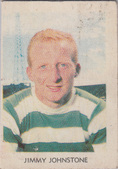
3bJimmy Johnstone (SCO)
1965 A&BC Scotland.
Voted by fans as Celtic’s best-ever player, Jimmy Johnstone led the club to an amazing 8 consecutive Scottish League titles from 1965 to 1973 plus another title in 1975. Additionally, he helped the club win the 1967 European Cup and finish as runners-up for the 1970 European Cup. Johnstone finished third in Ballon d'Or voting in 1967.
| 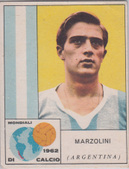
3cSilvio Marzolini (ARG)
1962 Mira.
The best South American defender of the 1960s, Silvio Marzolini won 4 league titles with Boca Juniors. He started left-back in the 1962 and 1966 World Cups and was named to the all-star squad in the latter tournament.
|
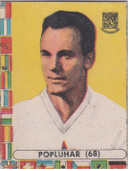
3dJán, Popluhár
1962 Lampo Mondaili.
Slovak defender Ján Popluhár was one of the best defenders of the early 1960s. A key member of the 1958 and 1962 Czechoslovakia World Cup teams, Popluhár was capped by his national team a total of 62 times.
| 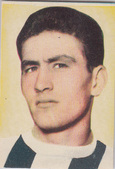
3eTarcisio Burgnich (ITA)
1959 Collezioni Lampo.
Regarded as one of the greatest Italian defenders of his time Tarcisio Burgnich was adept as a sweeper, centre-back and also as a right-back. He and Giacinto Facchetti formed one of the all-time best defenses at Inter Milan, and h helped the club win five Serie A championships and two European Cups. Burgnich played for the Italian national side in 66 matches, including the Italian team that finished second at the 1970 World Cup.
| 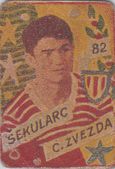
3fDragoslav Sekularac (YUG)
1963 Yugoslavian Issue.
Accomplished Serbian player and coach Dragoslav Šekularac was one of the top attacking midfielders of the early 1960s. He scored 119 times in 375 matches for Red Star Belgrade and is one of only five players given the top status of “Zvezdina zvezda” by the club. Capped 41 times by the national team, Šekularac was a member of the Yugoslavia side that won the silver medal at the 1956 Olympics.
|
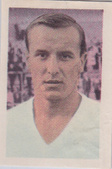
3gFerenc Bene (HUN)
1964 Ruiz Romero.
One of the top strikers of the 1960s, Ferenc Bene scored 303 goals in 417 appearances over his club career. He was even more successful on the international stage, leading the Hungarian national team to a gold medal at the 1964 Olympic games (during which Bene scored 12 goals), a bronze medal at the 1964 European championship and to the quarter-finals at the 1966 World Cup.
| 
3hJimmy Armfield (ENG)
1956 Barratt.
Voted "best right-back in Europe" between 1962 and 1964, Jimmy Armfield was capped 43 times by the English national team. This includes being selected for the 1966 team that won the World Cup though Armfield missed the tournament due to injury. Armfield was voted Young Player of the Year in 1959 and narrowly lost out to Bobby Charlton in 1966 as Footballer of the Year. Armfield captained Blackpool for more than a decade.
| 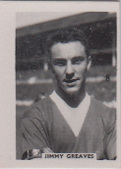
3iJimmy Greaves (ENG)
1958 Colinville Gum.
Jimmy Greaves is the highest goalscorer in the history of English top-flight football with 357 goals. He scored 44 goals in just 57 appearances for the English national team and was a member of the 1966 World Cup-winning side. Greaves was the First Division’s top scorer for six seasons.
|
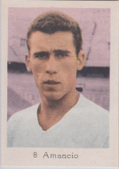
3jAmancio (SPA)
1962 Ruiz Romero.
Outside right Amancio Amaro was an instrumntal part of the “Yé-Yé Team”, the all-Spanish Real Madrid team, led by veteran Francisco Gento, that dominated Sapnish football in the 1960s. Between 1963 and 1976, the club won ten La Liga titles with Amancio. Capped 42 times by Spain, he was a member of the national sie that won the 1964 European Football Championship. Amancio twice won the Pichichi Trophy s the top goal scorer in La Liga.
| 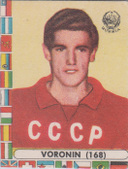
3kValriy Voronin (RUS)
1962 Lampo.
The Soviet Union’s Player of the Year for 1964 and 1964, defensive midfielder Valery Voronin earned 63 caps during his career. He won two Soviet Top League championships with Torpedo Moscow.
| 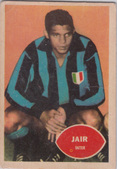
3lJair da Costa (BRA)
1965 Tarjeton (Topps).
A key member of “Grande Inter”, the dominant Inter Milan side of the 1960s, right winger Jair da Costa helped the team win 4 Serie A championships and 2 European Cups. He was only capped once by Brazil because Garrincha also played outside right.
|
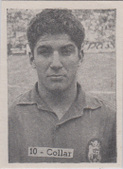
3mEnrique Collar (SPA)
1952 Jugadores Internacionales.
Striker Enrique Collar was a key member of the Atlético Madrid side that won 3 Spanish Cups between 1960 and 1965 as well as La Liga in the 1965-66 season. He was capped 16 times by Spain.
| 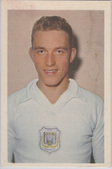
3nPaul Van Himst (BEL)
1962 Monty Gum.
Named best Belgium footballer of the past 50 years in 2003, Paul Van Himst is tied as the Belgium national team’s highest goalscorer with 30 goals. With his club Anderlecht, he won 8 Belgium championships and scored 233 goals in 457 matches.
| 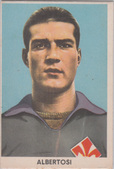
3oEnrico Albertosi (ITA)
1959 Siam IL Calcio. One of Italy’s great all-time goalies, Enrico Albertosi led the Italian national team to the 1970 World Cup finals. At the club level, Albertosi helped his clubs win two Serie A titles, three Italian Cups and one Mitropa Cup.
|
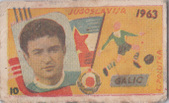
3pMilan Galić (YUG)
1963 Yugoslavian card.
Striker Milan Galić has scored the second most goals for Yugoslavia, with 37 goals in 51 national side appearances. He won four Yugoslavian League titles and two Belgian First Division titles in his club career.
| |